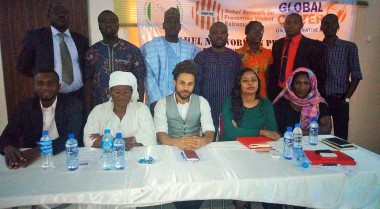
#SOSNicaragua: interview de l'activiste Chale Guadamuz
{French} Today is Peace Day. For this special day, we have sat down with Chale Guadamuz, a Nicaraguan activist in exile who is working through the #SOSNicaragua network. He and many other citizens have mobilized to protest an increasingly oppressive regime. Chale told us about the situation on the ground and implores action from civil society groups and governments around the world. Protests in the country began on April 18th, 2018, after which the Ortega administration has been accused of using excessive lethal force to quell them. To date over 350 Nicaraguans have died with many more injured and missing, creating a humanitarian crisis. Chale himself is visiting the Netherlands on a visa to raise awareness; knowing that he is not welcomed back in Nicaragua, his future is in limbo.
Chale, can you tell us about happened in Nicaragua?
So this situation started when… well, we haven't really had it going very well for decades now. But I think that over the past 10 to 11 years, while Ortega was in power, things were running smoothly enough for the majority of the population to ignore politics and go about their normal lives. Those who were savvy to corruption within the administration, to the injustices - the people who were essentially paying attention to politics - were completely censored by the government. They were threatened, silenced, and that was usually just the end of it. Society reached a critical point, and perhaps the series of injustices and grievances grew too large, and it all just essentially exploded from there. Before the protests, for example, our social security was bankrupt - but really bankrupt - after years of mishandling and - well, when the students got involved...
You mean when they cut pensions?
Yes, specifically when they cut pensions. This was the trigger, and everything built up to that moment. It's not the first time students protested in Nicaragua, but this was an instance where they took the lead and protested something that did not directly involve them - pensions - and they mobilized others to join them. The lack of social security and opportunities and basic freedoms is something that affected the majority of the Nicaraguan population. And it was because the government decided to block these protests, in a very violent way, that everything went out of control. By the second day, civil society groups were assisting the students and the government began attacking civil society groups as well. The government turned into a repressive organ; it got really, really bad. The conflict has escalated since then.

